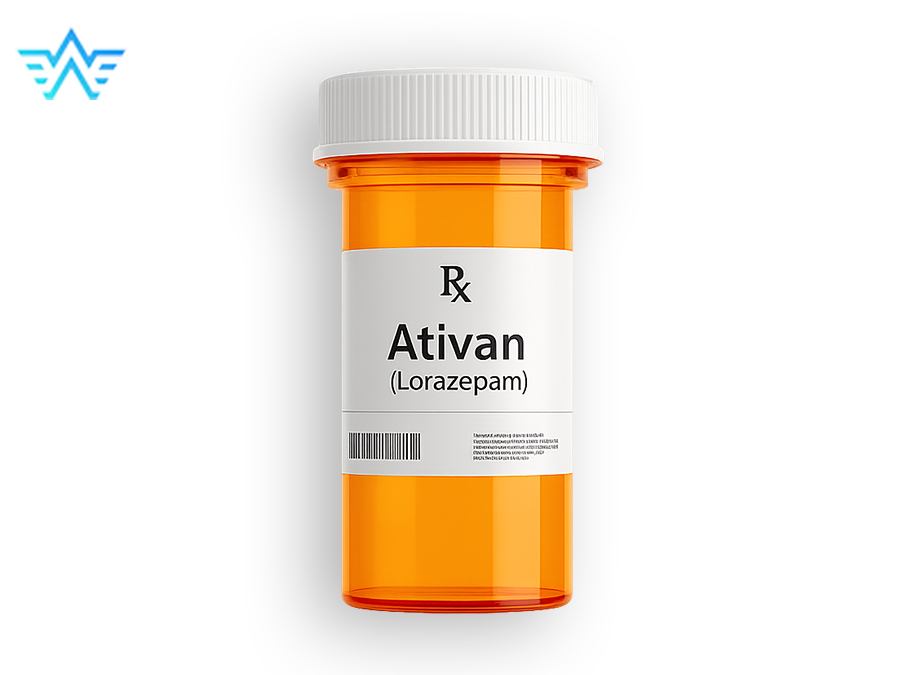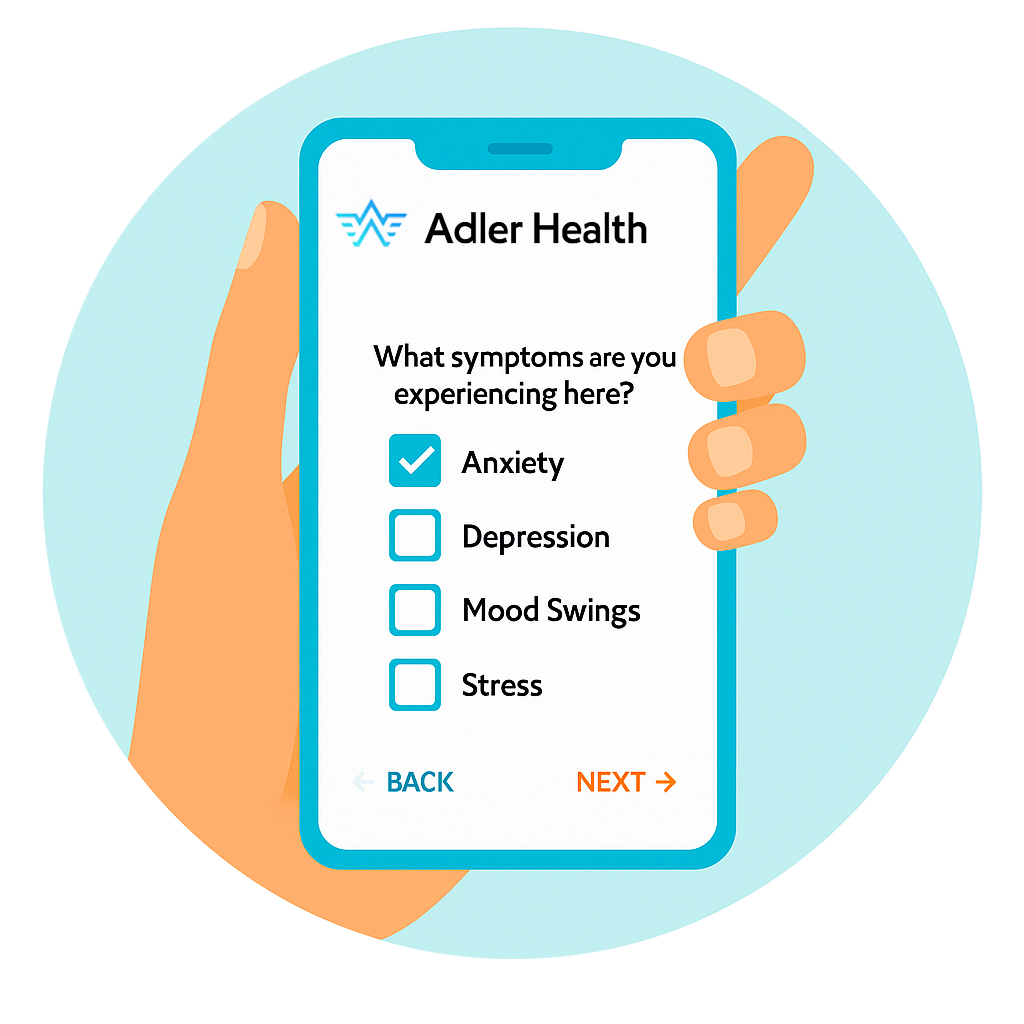Buy Lorazepam Online | Speak to Mental Health Experts
Lorazepam (Ativan) is one of the popular choices for managing anxiety disorders and related conditions. This medicine is actively used in modern clinical practice because starts working quickly and is rather effective. Yet it’s crucial to remember that benzodiazepines require responsibility. Lorazepam is strictly regulated and available only by prescription. There is a reason for such restriction. This medicine affects the central nervous system and can lead to addiction if used uncontrolled. Only licensed mental health professionals can prescribe this medication. At Adler Health, all consultations are handled by experienced specialists. During your free virtual visit, they’ll assess your needs, develop a treatment plan, and prescribe lorazepam if it’s clinically appropriate.

Starting at $2.75/ pill
When to Use Lorazepam
Each case requires a personalized approach. And only a physician can prescribe the medicine after a thorough assessment of the patient's health state and risks involved.
Anxiety is a primarily reason people take Lorazepam (Ativan). It’s more than just stress. This condition can really impact daily life over time. Chronic anxiety causes sleeplessness, trouble focusing, frequent headaches, etc.
Lorazepam (Ativan) can reduce internal tension and stabilize the emotional state, allowing patients to feel more at ease. The calming effect of the drug helps restore a normal psycho-emotional background.
Panic disorder involves episodes of intense fear/anxiety that happen for no apparent reason. People with regular panic attacks often have trouble breathing, trembling, and feel their heart racing.
Lorazepam (Ativan) is a quick fix for sudden panic attacks. Its basic component, Lorazepam, helps ease those uncomfortable feelings and can also stop future panic episodes, which is really helpful.
Sleep problems are another indication for prescribing Lorazepam (Ativan). Sleep is essential for the body's recovery, and its disruption can trigger various problems, e.g., concentration drops and poor overall health. Lorazepam is a sedative. That is, this pharmaceutical product makes it easier to fall asleep and prolongs sleep duration. Just keep in mind that it’s usually prescribed for short periods to avoid addiction and other side effects.
Doctors may also recommend Lorazepam (Ativan) for people going through alcohol withdrawal. This condition often takes place when stopping drinking alcohol after a long period of abuse. Alcohol poisoning and physical dependence manifest as seizures, anxiety, insomnia.
Lorazepam helps decrease symptom severity, facilitating the body's adaptation to life without alcohol.
In some cases, Lorazepam (Ativan) is used to stop epileptic seizures and convulsive conditions. Its ability to calm the nervous system quickly is useful when dealing with acute attacks. In emergencies, it can serve as a quick aid.
Lorazepam (Ativan) works well for muscle spasms, which can happen for various reasons like injuries, nerve issues, or side effects from other drugs. Lorazepam helps relax muscles, reducing pain and improving mobility.
How about using this remedy before surgeries or medical interventions that involve some psychological stress? Its calming and anxiolytic effects are beneficial here as well. Patients relax and get rid of stress, preoperative preparation becomes much easier.
How It Works

Quick Health Check
Provide your medical history and describe your symptoms in a short online questionnaire. This helps us understand your situation thoroughly. It only takes 5–10 minutes.

Expert Review by Licensed Providers
Our board-certified mental health providers review your answers and build a treatment plan just for you. You’ll get updates in your patient dashboard.

Prescriptions Shipped to You
Should treatment be necessary, your medication is shipped promptly right to your door in plain, discreet packaging for your privacy.
Therapy, Treatment Services, Prescriptions at Adler Health
How Lorazepam Works
The main ingredient in Ativan is Lorazepam, which is part of the benzodiazepine family. It acts on the central nervous system by interacting with certain receptors that control brain activity.
When entering the body, Lorazepam affects gamma-aminobutyric acid (short form – GABA), the primary inhibitory neurotransmitter in the brain. GABA helps reduce nervous activity and relax muscles, creating a calming effect. This mechanism explains Ativan's extensive range of action: alleviating anxiety and panic attack symptoms, soothing the nervous system, improving sleep, and much more.
What else is important? Mildsleep-inducing, anxiolytic (i.e., pain-relieving), and anti-seizure effects. These properties determine its use for various neuropsychiatric disorders. While Lorazepam doesn’t sedate as strongly as some other benzodiazepines, it offers a gentler approach for people looking for something less intense.
One standout thing about Lorazepam (Ativan) is its relatively fast action. Most people start feeling better within about 30 to 60 minutes after taking it. This is because Lorazepam is well absorbed in the gastrointestinal tract and quickly reaches the necessary levels in the bloodstream, thereby resulting in an effective impact.
Is it safe? Generally, yes, for short-term use. But its effects on the body still require attention. The medication may decrease cognitive abilities and worsen reaction time, so, if you're doing something that needs focus, like driving or working out hard, be careful.
When Not to Use Lorazepam
Lorazepam is strictly prohibited for some patients, while others should take a cautious approach.
The main contradictions include:
- Severe respiratory failure, especially in chronic lung diseases such as COPD or asthma.
- Sleep apnea syndrome, characterized by pauses in breathing during sleep. Lorazepam (Ativan) depresses the respiratory center, which is dangerous in such conditions.
- Myasthenia, i.e., muscle weakness. Taking the medicine increases weakness and potentially results in total loss of muscle tone.
- Liver failure. Lorazepam (Ativan) is metabolized in the liver, and its dysfunction dramatically increases the risk of toxic effects.
- Hypersensitivity to benzodiazepines or any other component of the composition – allergic reactions, including anaphylaxis, are possible.
Don’t neglect these restrictions to avoid complications.
Situations requiring strict medical supervision:
- Pregnancy –possible negative impact on the fetus, including congenital anomalies.
- Breastfeeding period – Lorazepam penetrates into breast milk and can cause lethargy, poor sucking, and drowsiness in the baby.
- Older age – people aged 65 and above face a markedly higher risk of cognitive decline, falls, confusion.
- Mental disorders with severe depression –sedative effect may worsen the condition.
- Alcohol or substance abuse – benzodiazepines are addictive drugs, and patients with a history of alcohol/substance abuse are particularly susceptible to them.
Even if Lorazepam (Ativan) seems like a good choice, nuances in your medical history or current condition may prove dangerous. A responsible physician always evaluates the risks and seeks a balance between benefits and possible complications. Self-medication with such drugs is unacceptable.
Lorazepam (Ativan) impacts the central nervous system, suppressing its activity.This means that when taken simultaneously with other substances that exert a sedative effect, the strain on the brain and organs rises.Combinations with antidepressants, opioids, antipsychotics, sleep aids, and anticonvulsants are very dangerous. Their interaction with Lorazepam increases drowsiness, disrupts breathing, slows reactions. You may also face fainting and respiratory center depression.
The combination of Lorazepam (Ativan) with alcohol deserves special attention. After all, even moderate amounts can dramatically increase its sedative impact.
What’s more, some drugs interfere with Lorazepam's metabolism, slowing down or speeding up its elimination. For example, rifampicin-based medications weaken the effect, while CYP3A4 inhibitors, on the contrary, enhance it. The combination can become a source of serious complications like confusion and seizures.
If it’s necessary to take several pharmaceutical products at the same time, the doctor selects a regimen based on possible risks and interactions. Don't experiment with your health! Even natural supplements, such as valerian or St. John's wort, require approval. Always remember this.
Prolonged use may cause addiction with a negative impact on the patient's mental/physical well-being. Over time, the body gets used to the drug, and the likelihood of tolerance increases, which necessitates a higher dosage to achieve the same effect. This often provokes unwanted reactions such as depression, issues with memory, focus, thinking…
Sudden cessation of Lorazepam (Ativan) sometimes triggers withdrawal symptoms, including increased anxiety;sleeplessness;andvarious physical ailments. Hence the need to stop treatment gradually. The dose reduction process must take place under a doctor's supervision, who will adjust the plan depending on the patient's reaction.
Lorazepam Dosages
For adults dealing with anxiety disorders, taking 2-3 mg of Lorazepam (Ativan) per day is typically sufficient. It's better to divide the dose into two or three administrations throughout the day. You might take less in the morning and afternoon, then a bit more in the evening. Why? Because internal tension tends to rise during evening hours; and difficulties with falling asleep arise. In cases of increased body sensitivity or mild forms of anxiety, doctors prescribe minimal dosages. For instance, 0.5 or 1 mg daily.
When it comes to severe neuroses, acute anxiety episodes, or panic attacks, patients can take up to 6 mg per day, split into several doses. Yet such regimens require strict medical supervision with constant adjustments depending on the patient's response. If there is a need for emergency relief of a panic attack/anxiety, a single dose of 1-2 mg can be used to stabilize the condition within 30-60 minutes.
People with short-term sleep issues (caused by stress, anxiety, or exhaustion) should take an evening dose of 1-2 mg 30-60 minutes before bedtime. If insomnia persists, the doctor may change the dose or suggest an alternative with a more pronounced hypnotic effect.
Lorazepam (Ativan) helps to cope with psycho-emotional stress and relax muscles in preparation for surgical operations as well as painful diagnostic tests. 2 mg should betaken1-2 hours before the procedure. The patient will stop worrying and tolerate medical intervention more easily.
In chronic status epilepticus requiring support, prolonged therapy at moderate doses (1-2 mg per day but not longer than 4 weeks!) along with other treatments is possible.
Elderly people and patients with weakened physical condition should use approximately half the dosage. The body reacts differently with age: metabolism slows down, sensitivity to sedatives increases. Even 0.5 mg may be enough to relieve anxiety and improve sleep without causing excessive drowsiness and dizziness.
Overall, dosage selection requires special attention. Healthcare providers take into account symptoms, medical history, responses to previous treatments, and any issues related to substance abuse. Self-adjustment of the dose is dangerous due to the high risk of side effects. This is especially true with a sharp increase in dosage – you may face symptoms like lethargy, confusion, and impaired coordination of movements.
How to take the medicine correctly? Swallow the pill with a little water. Chewing is not recommended so as not to change the absorption rate. It’s better to take Lorazepam (Ativan) immediately after meals or regardless of meals, depending on the doctor's instructions.
If you don’t get the expected relief after 5-7 days of treatment, contact your doctor and ask to review the regimen –increase the dose or select another therapy. Sometimes it is enough just to distribute the daily dose differently.
Side Effects
While Lorazepam can greatly improve how you feel, it can also cause some side effects. In some cases, they are weak and temporary, in others – more pronounced and require medical attention. Personal characteristics, the dose taken, and duration of treatment play a decisive role.
Some reactions appear right at the start of therapy. Here are the most common symptoms:
- drowsiness (most pronounced in the morning);
- dizziness and unsteadiness when walking;
- headache;
- slow reaction time, lethargy, a feeling of "fog" in the head;
- decreased concentration and attention;
- low sex drive;
- emotional dullness;
- mild nausea or dry mouth;
- weight gain;
- mood swings, irritability;
- muscle weakness or trembling in the body.
These effects usually disappear after a few days of adaptation. The body gets used to the new level of neurotransmitter activity, and the unpleasant sensations gradually fade away. Nevertheless, if symptoms persist or worsen, you should see a doctor.
There are also less common but more serious reactions that require immediate attention:
- breathing problems;
- speech disorders, confusion;
- paradoxical anxiety, aggressive outbursts;
- sudden depression, suicidal thoughts;
- allergic reactions: rash, itching, swelling of the face or tongue.
In such cases, stop taking the drug and seek advice from a physician! Waiting and self-medication are harmful behaviors.
Safety starts with the right approach. Please check out the following tips:
- Start with the lowest dose, whether you’re new to it or not.
- Avoid concomitant use of alcohol or sedatives.
- Don’t drive a vehicle in the first days of treatment.
- Follow a sleep and rest schedule.
- Stay hydrated to maintain metabolism.
- Inform your doctor about all medications you are already using.
Taking sensible precautions and focusing on your well-being will ensure a smooth adjustment period. When used in a controlled manner, Ativan acts predictably and gently.
How Quickly the Effect Begins and How Long It Last
Ativan starts working rapidly. The first signs of action appear after 20-40 minutes. Sometimes – faster. Especially with an empty stomach or increased sensitivity to benzodiazepines. A person experiences relief from anxiety and relaxation, internal tension goes away, breathing becomes more even, the pulse – calmer, movements – less abrupt. A feeling of peace arises.
The peak effect is observed within 1.5-2 hours. During this period, anxiety almost completely subsides, muscle tension decreases, it becomes easier to fall asleep or concentrate on a specific task.
Ativan's duration of action varies from 6 to 8 hours. Sometimes the effect lasts longer. For example, in older people and those with a slow metabolism. On the other hand, in younger patients with active metabolism, the effect may diminish sooner. Everything depends on individual body traits, weight, liver function, an, of course, general health.
Therefore, the drug works quickly enough to help in an acute situation, and long enough to not trigger repeated discomfort several hours later. That’s why it is so often used in emergency psychiatry for managing anxiety episodes and panic attacks.
Let Adler Health Serve You!
If you or a loved one is struggling with a mental health disorder or a co-occurring disorder, Adler Health is here for you. Contact us today to learn more about our mental health treatment programs and other resources.




